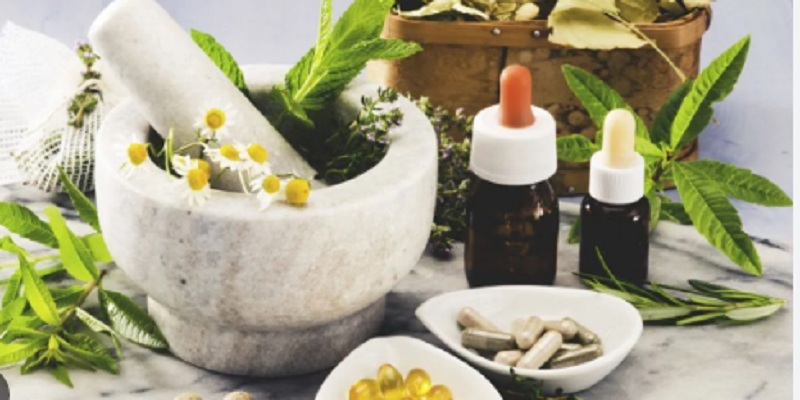By Anindita Chakrabarty
Few people would pop a medical pill without a doctor’s prescription or advice. The caution about self-medication or overuse, however, tends to drop when the pill in question is herbal. The common assumption is that since herbal pills are derived from natural sources, they must be safe to use freely without restrictions on courses and dosages.
This is a dangerous misconception.
The rise in use of herbal medicines and dietary supplements (HDS) over the years has increased the incidence of liver injury and damage, with people sometimes requiring liver transplants or even dying. In the US alone, HDS-related liver failure has increased eight-fold over the past 25 years.
A study from Korea found a similar trend, reporting that HDS overuse is linked to drug-induced liver injury which involves severe liver enzyme abnormalities, liver damage, the need for liver transplants and even death.
In 2022, the global herbal medicine and supplements market was valued at $US 70.1 billion, with projections to grow to $US 389.75 billion by 2031. The European Union is the largest consumer of HDS, accounting for 50 percent of global consumption.
With their increasing usage, drug-induced liver injury is becoming a growing health concern globally.
During the COVID-19 pandemic, many consumers turned to HDS products to boost their immune systems, using them as both preventive and therapeutic treatments. In the US, HDS sales surpassed $10 billion in 2020.
Part of the recent hype surrounding HDS is because the US Food and Drug Administration classifies them as food supplements. Unlike prescription drugs, HDS are not subject to regulation because they are plant-based and can be sold over the counter.
The use of such herbal medicines is part of ancient healing traditions in many cultures and countries.. In India, China, Korea and Singapore, among other places, traditional herbal medicines are officially recognised and integrated into public healthcare systems.
The health benefits of several such medicines and supplements are well-established.
Problems, however, may arise because of overuse or misuse.
Paracelsus, often known as the father of toxicology, famously said, “Solely the dose determines that a thing is not a poison.” In other words, the toxicity of a substance depends on the dose. Apart from the amount ingested, other factors such as its absorption by the intestine and the body’s metabolism, excretion and detoxification processes, which vary from person to person, also determine whether a thing eaten or drunk becomes poisonous for the individual.
Even drinking plain water in excess can lead to water intoxication and water poisoning in some people.
The same is true for other generally safe drinks and foods.
Green tea extract, a popular weight loss supplement, can be harmful for the liver in obese people with pre-existing chronic liver diseases. In such cases, obesity and liver damage lead to the accumulation of xenobiotics, meaning foreign substances, in the body. This leads to an increase in their concentration in the system and causes poisoning.
Ashwagandha or Indian ginseng is a widely used medicinal plant in India which is gaining popularity worldwide. Its extracts are known for their ability to reduce inflammation and treat ailments as diverse as arthritis, diabetes, hypertension and infertility.
One of the key compounds in ashwagandha is withanone. This has been shown to react with DNA, potentially leading to severe biological consequences such as DNA damage. When used in moderation, this effect is mitigated by a protective agent found in cells known as glutathione or GSH, a natural antioxidant.
However, if the ashwagandha extract dose is too high, beyond 2000 mg/kg body weight/day as recommended by the Indian Ministry of AYUSH the GSH system may become overwhelmed, leading to liver damage and toxicity.
Apart from overuse, there are also issues of quality control.
Studies have shown that many herbal formulations are adulterated with hazardous chemicals including phenylbutazone, antibiotics, alcohol, toxic industrial solvents, and high levels of toxic metals such as arsenic, mercury and lead.
Additionally, mislabeled or unlabeled products, unclear dosing instructions, lack of scientific methodology and insufficient post-marketing surveillance worsen the issues associated with an unregulated market.
The responsibility for ensuring product safety lies with the manufacturers of HDS, many of whom do not conduct preclinical safety tests or efficacy studies before marketing their supplements.
Identifying the causes of toxicity in patients using herbal medicines or supplements is challenging because of the numerous ingredients involved. It is crucial that guidelines and protocols are established to test HDS for toxicity, determine therapeutic doses and evaluate herbal formulations.
Given the growing popularity of HDS and the emerging evidence of their toxic effects, there is an urgent need for legislation to regulate the herbal drug market.
Consumers must be provided with scientifically accurate information about dosage, contraindications and efficacy, like the regulations applied to over-the-counter medications.
Dr. Anindita Chakrabarty is Associate Professor, Department of Life Sciences, Shiv Nadar Institution of Eminence, Delhi-NCR. Dr. Chakrabarty is interested in studying anti-cancer activity of natural products.
Dr. Goutam Chowdhury, an independent researcher currently at the Institut de R&D Servier Paris-Saclay, contributed to this article. He is interested in studying natural product-induced toxicity and carcinogenesis.
Dr. Shrijita Banerjee, Academic Associate, School of Natural Sciences, Shiv Nadar Institution of Eminence, Delhi-NCR, contributed to this article.
Originally published under Creative Commons by 360info™.















